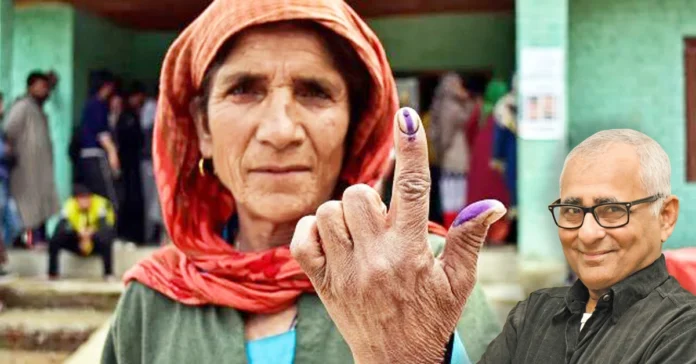By Inderjit Badhwar
In any democracy, the right to vote is sacred. It is the single act that makes each citizen an equal stakeholder in the nation’s destiny. It is also, by design, an act of trust—in the integrity of the system, in the neutrality of the institutions that conduct elections, and in the fairness of the process. When that trust is shaken, the consequences run deeper than a single election result; they seep into the very foundations of democratic life.
Our cover story this week looks at Rahul Gandhi’s “vote chori” campaign—a phrase that has, in a matter of weeks, gone from political slogan to a loaded accusation resonating far beyond party lines. Gandhi’s charge is simple, but incendiary: that India’s electoral process is being compromised, that voter rolls are riddled with errors and manipulations, and that the Election Commission of India is failing in its duty to safeguard the vote.
The campaign is crafted for both the street and the screen. Gandhi’s public appearances—sipping tea with voters declared dead, wearing T-shirts emblazoned with “Minta Devi, 124 not out” to mock glaring inaccuracies in electoral records—have become social media fuel. But behind the theatrics is a concrete demand: make the digital voter rolls public so that citizens and political parties can audit them.
It is a demand with teeth. Transparency in electoral rolls is not a matter of partisan preference; it is a matter of democratic hygiene. If you believe your name could be arbitrarily deleted, or that the rolls could be manipulated without recourse, the legitimacy of every election comes into question. That is why “vote chori” is more than an Opposition talking point—it is a potential inflection point in how India talks about its democracy.
The timing could not be more politically charged. The BJP, having fallen short of its “abki baar chaar-so paar” boast in 2024, is still the dominant political force, but no longer untouchable. The INDIA alliance, just six seats shy of the BJP’s tally, is seeking an issue that can unite its often fractious members. “Vote chori” may be it. The first real test will come in Bihar’s upcoming state elections, where the Opposition is betting that concerns over electoral integrity can cut across caste and community lines.
This cover story does not just chronicle Gandhi’s campaign; it interrogates the narrative war around it. The BJP, wary of letting the issue spiral, has dismissed the charges as theatrics, while quietly shoring up its own voter-contact operations. The Election Commission, for its part, has offered explanations, but no fundamental change to the system Gandhi is targeting. And then there is the generational twist: Gandhi’s remarks about the late Arun Jaitley— factually incorrect, as his son Rohan Jaitley swiftly pointed out—have added a personal feud to an already volatile debate.
What emerges is a picture of a political climate where accuracy is often the first casualty. Gandhi’s misstep on Jaitley’s timeline gave the BJP and its allies an opening to question his credibility. Yet the “vote chori” campaign’s traction shows that even flawed messengers can amplify powerful messages when they tap into a real public anxiety.
For this magazine, the significance of the story lies in the uncomfortable questions it forces us to confront. How resilient is our electoral process to human error, deliberate manipulation, or institutional complacency? Can a campaign led by a polarising figure still serve the larger cause of transparency? And perhaps most importantly: will this debate lead to substantive reform, or simply dissolve into the noise of India’s perpetual political theatre?
We are not in the business of endorsing parties or personalities. But we are deeply invested in the health of the democratic process. That is why this week’s cover is not just about Rahul Gandhi, or the BJP, or the next election. It is about the public’s ownership of the vote—and what happens when citizens begin to feel that ownership slipping away.
In the weeks to come, the “vote chori” narrative will either gain momentum or be neutralised by counter-spin. Either way, its emergence signals a shift in the battleground of Indian politics: from competing manifestos to the credibility of the system itself. For voters, that may be the most consequential contest of all.


